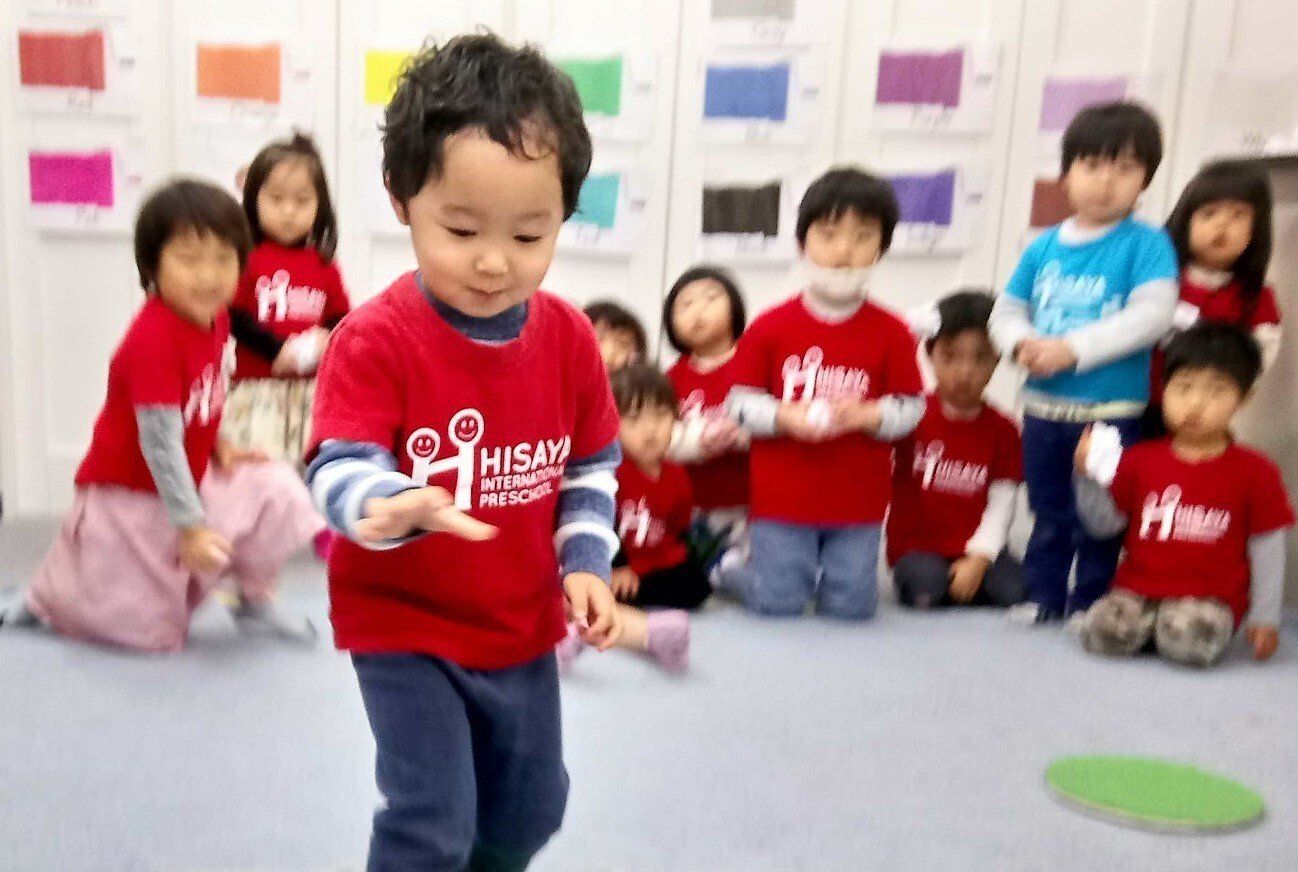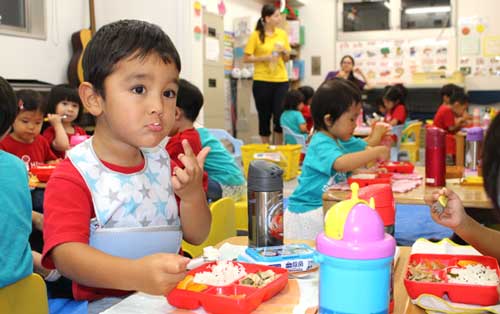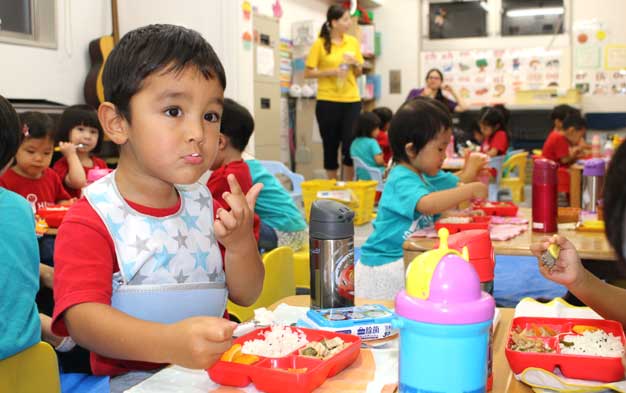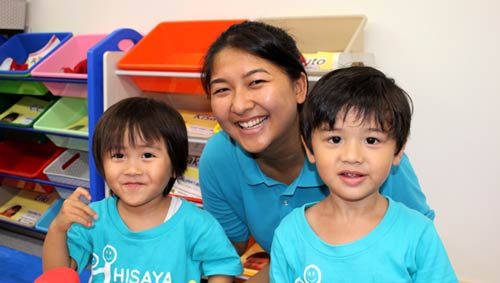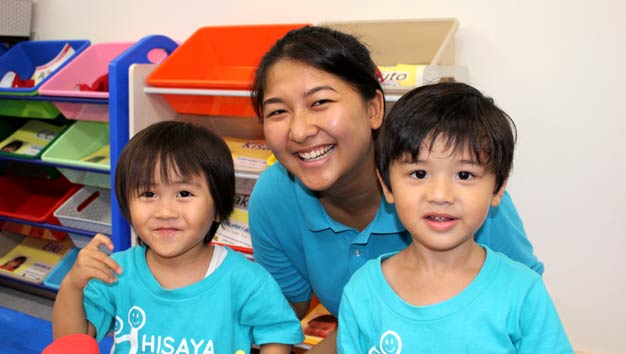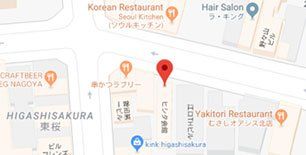Grasshopper (age 3 years)
Hisaya International Preschool's Grasshopper classes are for children 3 years of age.
Basic Skills:
- Communication skills
- Pre-reading skills
- Pre-writing skills
- Basic math and science concepts
- Letters and numbers recognition
- Color and shape awareness
- Hand-eye coordination
- Fine and gross motor skills
- Following directions
- English language development
Core Skills:
Communication skills
We teach the children how to ask and answer basic questions as well as how to follow basic directions. We also work on learning how to express our feelings such as anger or discomfort and solve differences with other children using words rather than actions.
Math and Science concepts
We encourage curiosity about the world and discuss science concepts that we encounter in everyday life such as the weather, microbiology (bacteria that make us sick), biology (animals, plants, insects, human body) mechanics, and how different things work.
Manners and Social skills
We help the children become self-aware. We work on being aware of others’ feelings and controlling our actions and emotions. We learn about appropriate ways to make requests and complaints and practice polite behavior.
Themes:
We have weekly themes that cover a large variety of subjects. These themes include body parts, emotions, family, clothes, school, in the home, and more. In addition to these themes, we also have special one-day themes such as holidays like Thanksgiving, Star Gazing Festival, and many others. For each of these themes, we have a set of corresponding vocabulary, images, songs, and activities to help the children learn more about them.
Social Skills:
Social skills for preschoolers are dependent on three different abilities: emotional self-control, empathy, and communication. At Hisaya International Preschool we base our social skills set on these three areas to teach our kids to understand their feelings and learn how to express themselves verbally instead of only physical gestures.
Texts:
Throughout the year, we will use one big text to compliment the learning we are doing in the classroom. In addition, we will read different books that correspond with our weekly themes. We will also use worksheets from various educational websites to strengthen the understanding of certain concepts.
Main Texts
School Zone: Big Preschool Workbook
A typical Grasshopper day:
| 8:00 | ★ Optional Early Start: Our early morning day care service starts bright and early at 8:00 am. Super popular with working moms and families that need help early in the morning. |
| 9:00 | Morning free play: important for helping develop relationships and allowing the children to pick up and learn to use language creatively and fluently (all classes play together). |
| 10:00 | Park Time: Kids spend time outside practicing gross motor skills and building relationships. We also take this opportunity to talk about the world around us such as nature, weather, seasons, and even traffic lights. |
| 11:00 | Circle Time:
We learn how to answer basic questions "How are you" and "How's the weather today?" We talk about daily routines, days of the week, and months of the year, and any special events or holidays. Book Time: Every week we read a book in accordance to our themes and then talk about what we read. Song Time: We use songs and dance to learn general concepts and practice fine and gross motor skills. |
| 11:30 | Worksheet Time: we use this time to practice proper grip and create an interest in writing. |
| 11:45 | Lunchtime: Students practice setting up table and eating by themselves. They have time to talk to friends and are expected to clean up afterwards. |
| 12:30 | Afternoon Free Play: Kids like to use language and concepts to talk to each other in the context of play. Imagination play and cooperative play are common at this time. This is also a time when the students work on their social skills and manners (all classes play together). |
| 13:20 | Activity: This is when we discuss our weekly theme and use craft to give the children hands on interaction with the concepts. |
| 13:50 | Snack Time: Students earn his/her snack by preparing the table. They practice how to dispose trash and clean up by themselves. |
| 14:00 | Pack Up and Go Home: This is a crucial time to develop independence. We encourage students to pack his/her school bags without help. |
| ★ Optional After School Day Care + Study Program: | |
| 14:20 – 15:00 / After School Day Care 15:00 – 16:00 / After School lesson time 1 16:00 – 17:00 / After School lesson time 2 |
|
| 17:00 | Evening Pick-up time |
| Learn more about the After School Program | |

